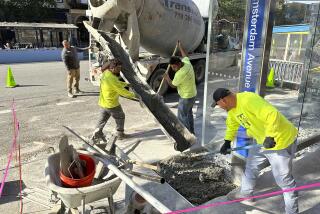Leading Indicators Index Increases 0.9%
- Share via
NEW YORK — A widely watched predictor of future economic activity rose in October, signaling that the economy would grow this year -- but at a more moderate pace than in 2004 -- despite being battered by hurricanes in August and September.
Some of that moderation may be due to a slowdown in the real estate market, which was a major booster of overall economic growth.
The Conference Board said its index of leading economic indicators, which tries to gauge future economic growth, rose 0.9% in October, offsetting a notable drop in September largely tied to hurricanes Katrina and Rita.
The Conference Board’s coincident index, a measure of current economic activity, rose 0.1%.
The Conference Board said October’s increase showed gains across many businesses except housing.
The largest positive contributors to the leading index were initial claims for unemployment insurance, which fell after being driven higher by the hurricanes, and average weekly hours in manufacturing, which also had been thrown off in September by disruptions tied to the storms.
The largest negative contributors were a decline in housing permits and a drop in stock prices. The index of consumer expectations held steady.
The leading index has slowed steadily since mid-2004. It grew at an almost 1% annual rate since January, compared with an approximately 4% expansion rate in the same period in 2004.
The index has remained relatively unchanged for most of the year and is now essentially at the same level as mid-2005.
The Conference Board said the index’s recent behavior was consistent with the economy continuing to expand more moderately in the near term.
“It is definitely clear that [housing] is one area where you will see less growth,” said Stephen Stanley, chief economist at RBS Greenwich Capital Markets.
“It goes from being a positive to a neutral in terms of what it means for the leading index” and overall economic activity, he said.
Stanley added that much of what goes on in real estate would hinge on interest rates, which determine borrowing costs for home buyers and affect growth in jobs and wages -- factors that shape home-buying decisions. The Federal Reserve has been raising interest rates, tightening credit policy to choke off inflation.
Gerald Zukowski, deputy chief economist at Nomura Securities International Inc., said, “The decline in permits is more indicative of the longer trend. The permits component is indicating that this boost to the economy will subside in upcoming quarters.”
Zukowski pointed to recent data from home builders and lenders as evidence of a slowdown in home sales activity.
Last week, the Mortgage Bankers Assn.’s gauge of demand for home loan refinancings fell to lows not seen since December 2004, and the National Assn. of Home Builders’ survey of sentiment among housing contractors dropped to its lowest level since April 2003 amid diminished expectations for home sales in coming months.
More to Read
Inside the business of entertainment
The Wide Shot brings you news, analysis and insights on everything from streaming wars to production — and what it all means for the future.
You may occasionally receive promotional content from the Los Angeles Times.










